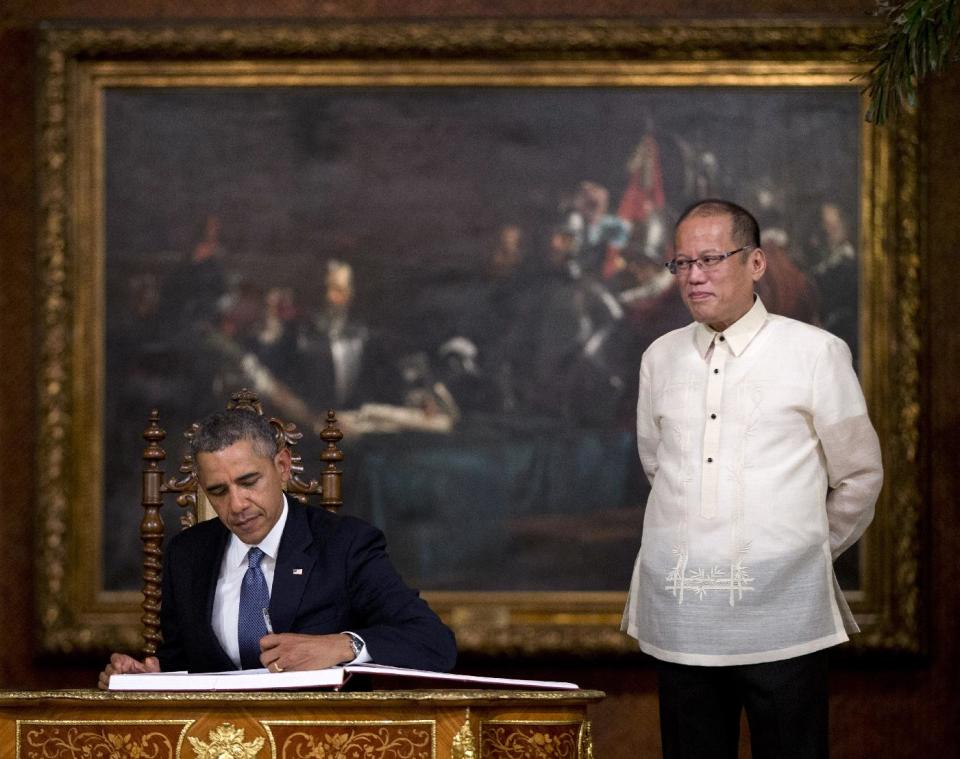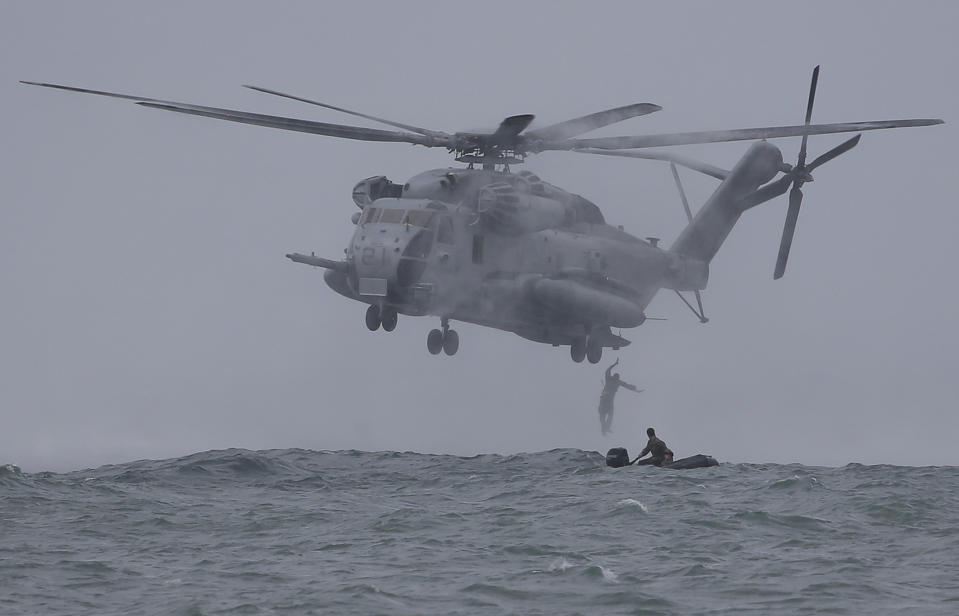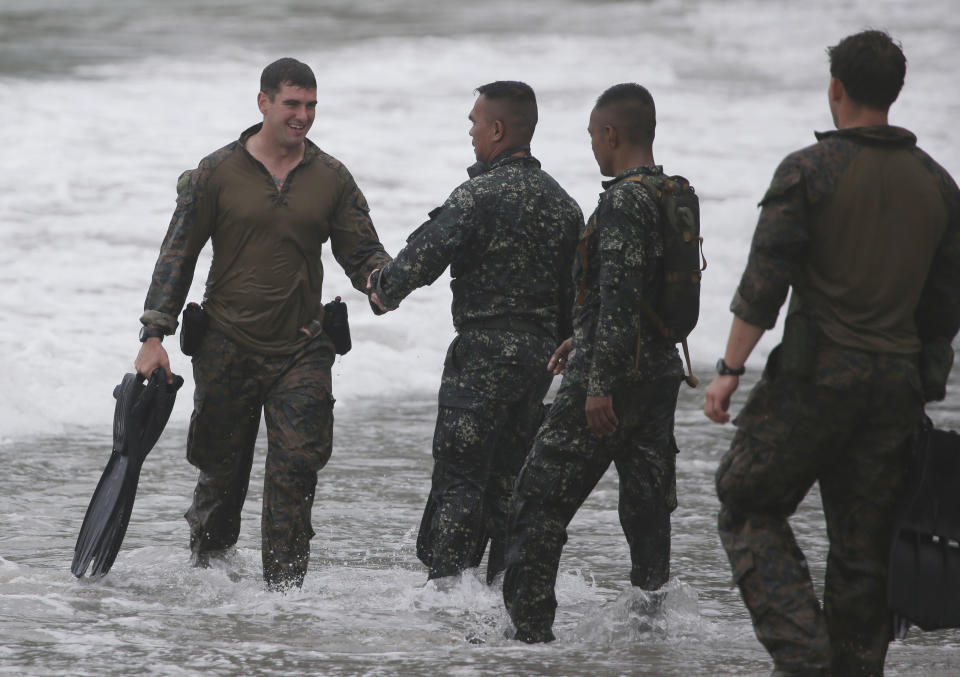New pact reflects closer US-Philippine ties
MANILA, Philippines (AP) — A new defense pact that will allow thousands of U.S. troops to be temporarily based in Philippines for the first time in more than 20 years signals closer cooperation in the allies' hot-and-cold relationship that has been shaped over the decades by war, terrorism and now, jitters over China's rise.
The 10-year agreement, signed Monday as President Barack Obama arrived in Manila, is considered the centerpiece of his four-nation Asian trip, which he used to reassure allies like Japan and the Philippines of American military backing as they wrangle with China in increasingly tense territorial disputes.
Obama said the Enhanced Defense Cooperation Agreement showed that Manila and Washington have emerged from a rough period in their alliance.
"We're here in the Philippines signing a defense agreement," Obama said at a news conference with President Benigno Aquino III at Manila's presidential palace. "Ten years ago, 15 years ago, there was enormous tensions around our defense relationship with the Philippines."
The pact will allow thousands of rotating batches of U.S. forces to gain temporary access to at least 10 Philippine military camps, paving the way for the largest deployment of American forces since U.S. bases in the country were closed in 1992. It will also allow the United States to station fighter jets, ships and surveillance equipment in the Philippines on a limited basis.
Analyst quote here ...? or below?
Obama said the deal was not meant to counter China but to promote peace and stability in Asia amid a much-touted "pivot" by Washington to the Pacific.
But China's increasing assertiveness in the region is clearly a factor and before he left Obama said the U.S. would honor its commitment to defend Manila under a 1951 Mutual Defense Treaty.
"Let me be absolutely clear," he told U.S. and Philippine troops and veterans at a sweltering army gymnasium. "Our commitment to defend the Philippines is ironclad."
The Philippines has been embroiled in territorial disputes with China for about 20 years, including the Scarborough Shoal, a reef in the South China Sea that Beijing took effective control of in 2012. The two countries are in a standoff over the Second Thomas Shoal, where Filipino marines are manning a rusty ship that was intentionally run aground.
Tensions have also risen between Japan and China over another set of islets in the East China Sea.
Analyst quote here... ?
Underscoring his point, Obama quoted lines from the treaty, where both nations pledged a "common determination to defend themselves against external armed attacks, so that no potential aggressor could be under the illusion that either of them stands alone."
The countries have had a roller-coaster relationship going back more than a century — including several decades when the Philippines was a U.S. colony.
America's foray into the Philippines started when it defeated the Spanish fleet in the Battle of Manila Bay in 1898, ending more than three centuries of Spanish colonization. But the Philippines was ceded shortly after to the United States and only gained independence in 1946, a colonization that was disrupted by the invasion and occupation of the Japanese imperial army.
After World War II, the U.S. maintained bases in the Philippines for nearly a half-century, but those were shuttered in 1992 amid rising nationalism, and military ties between the nations became virtually frozen.(too strong?)
Territorial disputes with China in the mid-1990s prompted Manila to reach back out to Washington.
The Philippines discovered that China has taken control of a disputed reef off its western coast in the South China Sea and built hut-like structures over the submerged coral outcrops. In 1998, the U.S. and Philippines signed a treaty that allowed large military exercises to resume in the country.
The Sept. 11, 2001, attacks brought the U.S. and Philippine militaries closer, with Filipino officials allowing hundreds of American counterterrorism troops to train Filipino soldiers fighting al-Qaida-linked militants in the south.
At the army gymnasium, Obama also paid tribute to some of the surviving Filipino World War II veterans.
In April 1942, after the Japanese invasion of the Philippines, tens of thousands of sick and exhausted American and Filipino prisoners were forced to trek for five days for 105 kilometers (65 miles) to a prison camp in what has been called the infamous "Bataan Death March." Survivors recounted to Obama how many prisoners being stabbed or decapitated by their Japanese captors if they stopped to drink or collapsed from exhaustion.
"I am never prouder than being able to stand before you as your commander-in-chief," he told the veterans Tuesday before posing for photos with them.
Sitting in a wheelchair, a 91-year-old veteran, Ret. Col. Romeo Castro, shook Obama's hand. He told a reporter that said he wanted the U.S.-Philippine alliance to last "forever" to counter external threats like the Japanese before and China now.
"We need them to protect us from our enemies," Castro said.
_____
Associated Press writers Oliver Teves and Teresa Cerojano in Manila contributed to this report.



